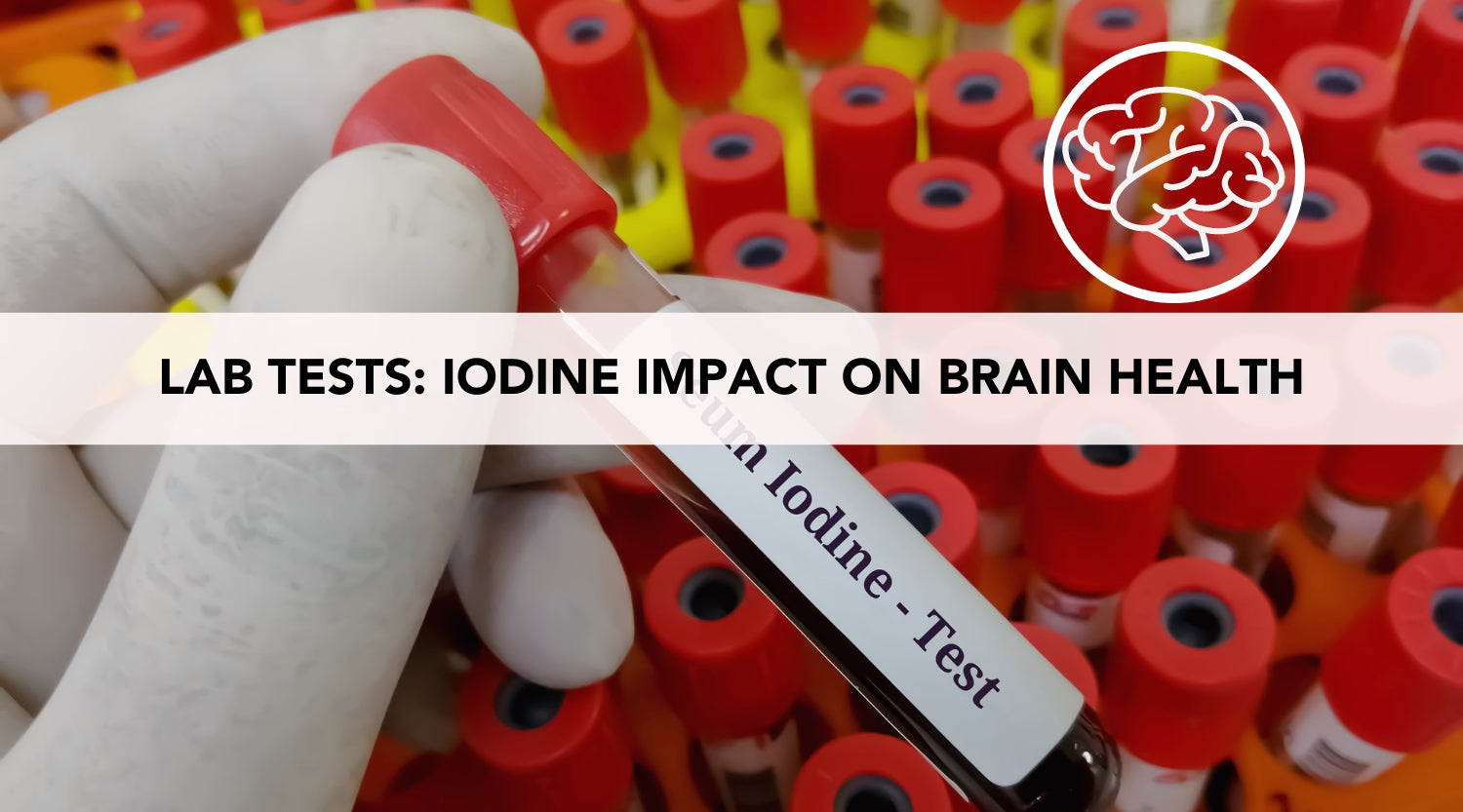
Unveiling the Connection Between Iodine and Brain Health: What Lab Tests Reveal
Iodine is a vital trace mineral that plays a crucial role in many aspects of human health, especially brain development and cognitive function. It is most commonly recognized for its importance in thyroid function, but its influence on the brain is equally significant. An iodine deficiency can lead to profound neurological impairments, including developmental delays and cognitive decline. But what is the exact relationship between iodine and brain health? How can lab tests help uncover the mysteries behind this essential nutrient? This article will explore these questions and offer a comprehensive guide on the iodine-brain health connection.
The Importance of Iodine for Brain Development and Function
Iodine’s Role in Thyroid Hormone Production
Iodine is essential for synthesizing thyroid hormones, primarily thyroxine (T4) and triiodothyronine (T3). These hormones regulate metabolism but are also critical for brain development and function. Thyroid hormones control the maturation of the brain during fetal development and continue to influence cognitive functions throughout life. When the body lacks sufficient iodine, it can lead to reduced production of these hormones, resulting in hypothyroidism, which is linked to impaired cognitive function and developmental issues.
Impact on Fetal Brain Development
One of the most essential roles iodine plays is during pregnancy, where adequate iodine levels are critical for the developing fetus. Iodine deficiency in pregnant women has been shown to result in congenital hypothyroidism, which can lead to cretinism, a severe form of intellectual disability. Even mild iodine deficiency during pregnancy can lower children's IQ levels and impair their cognitive abilities later in life.
Iodine Deficiency and Cognitive Decline
In adults, iodine deficiency is associated with cognitive impairment, reduced work productivity, and poor quality of life. Research has demonstrated that individuals with low iodine levels have an increased risk of developing neurodegenerative diseases like Alzheimer's and Parkinson's. Furthermore, adequate iodine intake is essential for maintaining optimal mental health, as deficiencies have been linked to anxiety and depression.
What Lab Tests Reveal About Iodine Levels
- Urinary Iodine Concentration (UIC)
Urinary iodine concentration (UIC) is one of the most commonly used lab tests to assess iodine levels in the body. Since iodine is excreted through urine, this test provides a reliable measure of an individual's recent intake. It is instrumental in population studies to assess the iodine status of large groups. A single-spot urine test might not provide the most accurate picture for individual diagnosis due to variations in daily iodine intake, so a 24-hour urine collection is sometimes recommended.
- Normal Range: A UIC between 100-199 µg/L is considered adequate for adults.
- Deficiency: A UIC below 100 µg/L indicates iodine deficiency. Levels below 20 µg/L suggest severe deficiency.
- Serum Thyroid-Stimulating Hormone (TSH)
The pituitary gland produces thyroid-stimulating hormone (TSH) to regulate thyroid hormone production. When iodine levels are insufficient, the thyroid cannot produce enough T3 and T4, increasing TSH levels. Elevated TSH is often one of the first indicators of iodine deficiency.
- Normal Range: The reference range for TSH is generally 0.4-4.0 mU/L, but optimal levels for healthy thyroid function are often considered to be between 0.5-2.5 mU/L.
- Elevated TSH: Elevated TSH levels may indicate iodine deficiency or thyroid dysfunction. This condition may be followed up with further testing of thyroid hormones (T3 and T4).
- Thyroxine (T4) and Triiodothyronine (T3) Levels
Thyroid hormone tests measure the levels of T4 (the inactive form) and T3 (the active form) in the blood. As iodine is required to synthesize these hormones, low iodine levels result in lower concentrations of T4 and T3. Monitoring these levels is critical in diagnosing and managing iodine deficiency disorders.
- Normal Range:
- T4: 5.0-12.0 µg/dL
- T3: 100-200 ng/dL
- Low T4 and T3: Low levels may suggest hypothyroidism, which could be caused by iodine deficiency.
- Thyroglobulin (Tg) Test
Thyroglobulin is a protein produced by the thyroid gland, and its levels can indicate iodine status. Elevated thyroglobulin levels can indicate iodine deficiency, particularly in children and pregnant women. This test is often used with others to understand iodine status fully.
- Normal Range: The reference range for thyroglobulin is typically less than 40 ng/mL.
- Elevated Levels: High levels may suggest iodine deficiency or thyroid inflammation.
- Iodine Loading Test
The iodine loading test measures how well the body absorbs iodine and excretes the excess. This test gives a large dose of iodine, and the amount excreted in the urine over 24 hours is measured. If a large portion of the iodine is retained, it may indicate a deficiency. This test is considered one of the most comprehensive ways to evaluate iodine sufficiency.
Understanding Lab Results in the Context of Brain Health
Correlation Between Lab Results and Cognitive Function
Numerous studies have shown that lab tests revealing iodine deficiency are closely correlated with impaired cognitive function. For example, elevated TSH and low T4 levels are often observed in individuals suffering from memory loss, attention deficits, and slower mental processing speeds. These lab findings highlight the profound impact of iodine on the brain's ability to perform at an optimal level.
Iodine Supplementation and Brain Health Recovery
In cases where lab tests confirm iodine deficiency, supplementation can help restore normal brain function, especially if caught early. In children, iodine supplementation has significantly improved cognitive abilities, school performance, and overall brain health. In adults, correcting iodine deficiency can help reduce the risk of neurodegenerative diseases and improve mental clarity, focus, and mood.
However, it’s important to note that too much iodine can also adversely affect brain health. Excessive iodine intake can lead to hyperthyroidism, which has been associated with irritability, anxiety, and even cognitive impairment. Therefore, lab tests are crucial in determining the correct supplement dosage and ensuring that iodine levels are maintained within a healthy range.
Best Practices for Managing Iodine Levels in the Brain
Strategies for Optimal Iodine Intake and Balance
To manage iodine levels for brain health, it's vital to adopt specific strategies:
- Include Iodine-Rich Foods: Incorporate Sea vegetables, fish, dairy, and eggs into your diet.
- Use Iodized Salt: Opting for iodized salt can help maintain sufficient iodine intake.
- Supplements When Needed: If the diet does not meet the needs, consider iodine supplements, but consult a healthcare provider first.
- Regular Monitoring: Schedule periodic lab tests to keep track of iodine levels in the body.
- Balanced Diet Planning: Ensure a balanced diet that is also rich in selenium and other nutrients that aid iodine's work in the brain.
- Awareness of Iodine Antagonists: Be mindful of substances that can inhibit iodine absorption, such as certain vegetables and medications.
Each step requires guidance from health experts, especially when dealing with deficiencies or excess.
Why Lab Tests Are Essential for Iodine and Brain Health
Iodine’s role in brain health cannot be overstated. From fetal development to adult cognitive function, this essential mineral is crucial for maintaining mental well-being and preventing cognitive decline. Lab tests like urinary iodine concentration, TSH, and thyroid hormone levels provide a clear window into the body's iodine status and are essential for diagnosing iodine deficiency or excess. By interpreting these lab results correctly, healthcare professionals can offer targeted interventions to improve brain health through dietary adjustments or iodine supplementation.
Proper testing and monitoring can ensure optimal iodine levels, leading to improved cognitive function, mental clarity, and overall well-being. So, if you're concerned about your brain health or suspect an iodine deficiency, consult your healthcare provider to run these vital lab tests and start your journey toward better mental and physical health.
References
- Zimmermann, M. B., Jooste, P. L., & Pandav, C. S. (2008). Iodine-deficiency disorders. The Lancet, 372(9645), 1251-1262. https://www.thelancet.com/article/S0140-6736(08)61005-3/abstract
- Hetzel, B. S. (2000). Iodine and neuropsychological development. The Journal of Nutrition, 130(2S Suppl), 493S-495S. https://www.sciencedirect.com/science/article/pii/S0022316622110825
- World Health Organization. (2007). Iodine deficiency in Europe: A continuing public health problem. WHO Regional Office Europe. https://iris.who.int/bitstream/handle/10665/43398/9789241593960_eng.pdf
- Zimmermann, M. B. (2012). The effects of iodine deficiency in pregnancy and infancy. Pediatric and Perinatal Epidemiology, 26(S1), 108-117. https://onlinelibrary.wiley.com/doi/full/10.1111/j.1365-3016.2012.01275.x
- Chung, Hye Rim. "Iodine and thyroid function." Annals of pediatric endocrinology & metabolism 19.1 (2014): 8-12. https://synapse.koreamed.org/articles/1516085318
